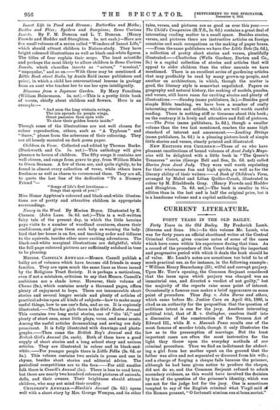CURRENT LITERATURE.
FORTY YEARS IN THE OLD BAILEY.
Forty Years in the Old Bailey. By Frederick Lamb. (Stevens and Sons. 10s.)—In this volume Mr. Lamb, who was for forty years an official shorthand writer at the Central Criminal Court, gives concise notes of some of the cases which have come within his experience during that time. As a record of the procedure of this Court during the important and progressive period with which it deals the book should be of value. Mr. Lamb's notes are sometimes too brief to be of much practical use, as for instance, in the following example : "William Henry Beauchamp (35), wilful and corrupt perjury. Upon Mr. Torr's opening, the Common Serjeant considered that the issue upon which perjury was charged was an immaterial one, and directed a verdict of not guilty," but the majority of the reports raise some point of interest. Occasionally a famous ease makes a brief appearance on some point of procedure. Thus Reg. v. Jahn Burns and others, which came before Mr. Justice Cave on April 6th, 1886, is cited as an authority for the proposition that the question of seditious intent is one for the jury. Another interesting political trial, that of B. v. Gallagher, resolves itself into a discussion of the construction of the Treason Act of Edward III., while B. v. Hannah Peace recalls one of the most famous of murder trials, though it only illustrates the law as to the presumption of marriage. But the least important cases are often the most instructive for the light they throw upon the everyday methods of our criminal procedure. Thus we find an indictment for abduct- ing a girl from her mother upset on the ground that the father was alive and not separated or divorced from his wife ; and a charge of forging a cheque fails because the prisoner, although he had been given notice to produce the cheque, did not do so, and the Common Serjeant refused to admit secondary evidence, as this would have involved the decision by him of the question of the prisoner's identity, which was one not for the judge but for the jury. One is sometimes tempted to say of the English criminal -What Virgil said of the Roman.peasant, " 0 fortunati nimium sua si bona norint."


































































 Previous page
Previous page